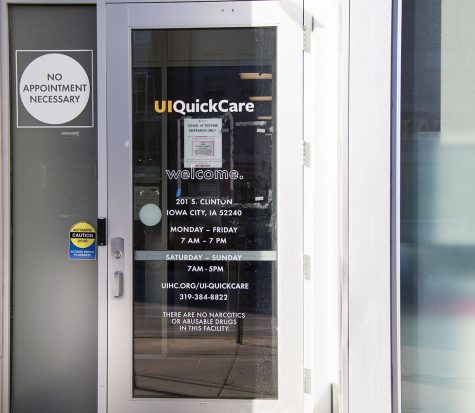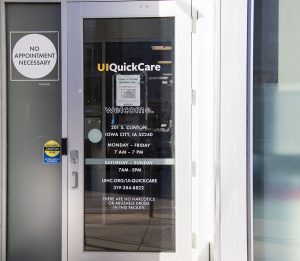University of Iowa dieticians offer advice as disordered eating habits rise during pandemic
With having to convert to a lifestyle of staying home and quarantining, daily routines have changed, causing many people to develop unhealthy eating habits by eating too much or not enough.
November 30, 2020
As COVID-19 has caused people to remain at home and modify daily routines, many have developed unhealthy eating habits by eating too much or not enough. Dieticians at the University of Iowa recommend setting reminders to make meals, go for walks, and getting proper amounts of sleep to improve eating habits.
University of Iowa Student Health dietitian JoAnn Daehler-Miller said she has seen an increase in students struggling with eating.
“I cannot say that I have seen an increase in total number of students, but what we are seeing an increase in is disordered eating,” she said. “Either full-blown eating disorders or students that their relationship with food has been [negative] all along.”
Miller recommended students make an appointment with a student wellness nutritionist for prevention and treatment options. Student wellness offers services not just for students with disordered eating, but nutritionists also can set up a plan for students navigating food intolerances or who are on a tight budget.
Those who are struggling with eating disorders may have been struggling before COVID-19, Miller said. With gyms and other exercise facilities closed, she added, many have become more concerned about overeating or restricting.
“My total number of appointments has not gone up, but typically a lot of students see our [other] specialists and then get referred to me. But definitely a lot more referrals than in the past,” Miller said.
When looking to the future after the pandemic has passed, Miller said it could take longer for students who developed anxiety to recover.
“I think that people who have developed a lot of anxiety around the COVID-19 situation,” Miller said. “That is going to take a long time to go through and go away.”
According to a Scientific American article, a study published last month in the International Journal of Eating Disorders revealed that during the early months of the pandemic, many individuals with anorexia reported restricting their eating more. Those with bulimia and binge-eating disorders reported more urges and episodes, as well.
More than a third of the 1,021 participants in the study said their eating disorder had worsened – attributing this change to a lack of structure, a triggering environment, the absence of social support, and an inability to obtain foods that fit their meal plans, the study said.
Other on-campus resources for UI students, faculty, and staff include four-week workshops on intuitive eating, a network of UI health care professionals that offer eating disorder treatment and prevention services, the Food Pantry at Iowa, which provides free food and toiletry items, and a recipes page.
Taylor McDaniel, an outpatient dietitian in the bariatric surgery department at UI Hospitals and Clinics, said she has seen an increased need for nutrition counseling due to finances and stress surrounding the pandemic playing a major role in people’s lives.
“They are searching for ideas on how to purchase healthy foods for a low cost and ways to prepare them,” she said. “In the people I have been working with for many months, I’ve noticed some of them fall back on bad habits as they try to cope.
“Some patients might struggle with the mental load of being separated from their loved ones,” she said. “Others might struggle with finances and too much time on their hands if their job was eliminated due to cut-backs.”
Patients used to complain that they didn’t seem to have enough time to meal prep, exercise or sleep enough, McDaniel said, but now that they have more time, it is difficult to begin a new healthy routine.
When it comes to those who are struggling, McDaniel recommended people should start with a consistent sleep schedule.
“Having a routine is wonderful, developing a routine is hard,” she said.
She added that creating a grocery list that includes snacks and meals to make for the week can help with creating a routine, as well as setting reminders to eat a meal, drink enough water, or go for a walk.
Students and young adults have seemed to be those at the forefront of this issue. UI first-year Eve Montesano said it has been harder to eat like she used to due to being indoors so much.
“Before COVID-19, I was super active, so my appetite was very high,” Montesano said. “But once I was not able to do everything I used to do, my appetite declined with it.”
Montesano said because of the pandemic, however, her eating habits have actually changed in a good way.
“I became more cautious of what I was eating and how often,” she said, “…but I do not have any restrictions or anything like that.”


















